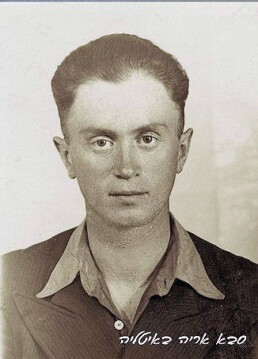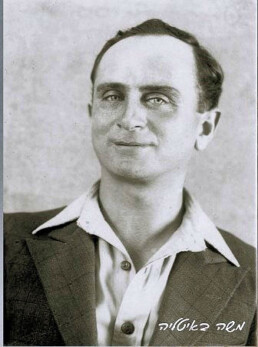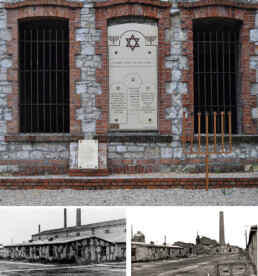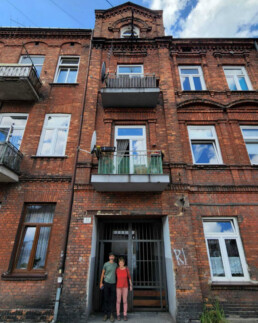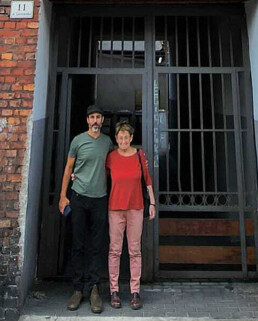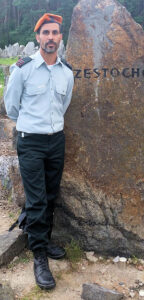My Częstochowa
by TOMER GEKLER (Israel)
When did my roots journey begin?
Maybe it was after I returned from “Witnesses in Uniform”, a journey of a group of IDF soldiers to Poland as part of my reserve service?
Maybe, when I suggested to my mother that, in honour of her 70th birthday, she should come with me on a family roots tour of Poland and Lithuania?
Maybe, right when we boarded the plane to Poland, after four hours of waiting in the Ben-Gurion Airport?
The truth is that, for me, the journey started right from the day I was born.
BACKGROUND
I am Third Generation of Holocaust survivors, who tried with all their might to live a normal life – tried and did not always succeed.
Apparently we lived an ordinary life. The stories of the Holocaust, which we heard at home from time to time, seemed to us to be heroic stories about heroes, who fled and survived, kinds of supermen who lived with us. We didn’t really understand the stories of the horrors that, from time to time, were shared with us. Our young souls were too delicate to understand, but the story was implanted within us. Even more than that, we also absorbed the anxiety, the survival instinct, the determination, the perseverance and the lust for life.
And there was also a considerable amount of constant sadness, which accompanies us as a trans-generational inheritance without our always knowing its origin.
My journey to Poland and Lithuania begins with a search for the roots of all my grandparents, who survived there by the skin of their teeth. I arrive in Częstochowa following one of them – Aryeh Leib Kolin ha’Kohen (“ha’Kohen” referring to the priestly class of which he was a member) or as he is known to me, “Grandpa Aryeh”.
Grandpa Arya died when I was nine-years-old and my childhood memories of him are very sketchy. As a child, I experienced my grandfather as an elderly man, whose character was the product of his Diaspora upbringing. I never really engaged with him. When I was nine-years-old and my brother, Yoav, had his bar-mizvah, Grandpa Aryeh gave me a small tallit as a gift, a tallit which, over the years , was left in my mother’s cupboard, patiently waiting for me to go and seek the grandfather whom I never really knew.
I began my renewed journey, to get to know my grandfather at an older age, after years of running away from the stories of the Holocaust and my family history. Like everyone else, I wanted to be the most Israeli, the most cosmopolitan, the most educated, the coolest, the most ….. But there is a moment when a person stops and looks at his life and questions who he really is. For me this moment began to sprout towards the age of forty. My two young children had grown up in a global and western culture, and I began to ask myself, what did I want for them and what did I want for myself.
Right at that time, on a summer day, the phone rang. It was the liaison officer of the reserve battalion in which I served at the time. I was expecting the standard summons to report for reserve duty but, instead, the liaison officer had a surprise – “we have been assigned to take you on a ‘Witnesses in Uniform’ trip to Poland. The truth is that I was surprised and, although I didn’t officially refuse, I decided that this was not for me and that I would not join this trip. For me, my involvement with the Holocaust narrative ended with my high school memorial ceremonies.
It took me another week of reflection, and talking with my older brother, for me to realise that I had nothing to lose. If someone offers you a trip abroad for free, you don’t say no, even if it’s to Treblinka. These were,s more or less, the considerations I had at the time for either going or refusing.
Six years before that phone call, my father David Gekler had died of cancer. In the months after he passed away, I found myself having a hard time recalling the beautiful moments, life before the illness and the moments of grace in the last months that I had accompanied him. All I could remember were the difficult moments in his last days and hours. This difficulty sharpened my understanding that traumas, whether they are personal, communal or national, have the ability to take over memory and, ultimately, one’s being. This insight suddenly dawned on me during the long trips during the “Witnesses in Uniform” trip to Poland.
There was this realisation that our observations of Jewish life before the Holocaust were, intentionally or unintentionally, coloured by the gloomy colours of their final chord – the Holocaust of the Jews of Europe and the personal Holocaust of my family.
With this understanding, I set out to collect fragments of evidence and stories that would help to understand the sequence of generations, rich in conceptual and cultural depth, that will connect me to my roots and to the source from which I came.
PLANNING THE TRIP
Aryeh Leib Kolin was born in Częstochowa on 8th April 1913, to a traditional religious family. That having been said, from the few stories which I was able to collect, it seems that, besides great loyalty to the tradition of our ancestors, the family was open to modernity. My grandfather Aryeh Leib and his brother Moshe belonged to the ultra-Orthodox sect of Radomsker Hasidism, which was very active in the Częstochowa area before the Holocaust. Apart from this fact, I was not able to find out much about life before the Holocaust. Grandpa Aryeh had two sisters, Sarah and Rachel, who were probably sent to their deaths in Treblinka, just like like their parents Frida (nee Rajch) and Szalom Kolin.
After my having spent two years of work in New York as an emissary of the Jewish Agency, I began planning our family trip to Poland in honour of the 70th birthday of my mother, Shoshana Gekler, Aryeh’ daughter. Haim Gekler, my uncle, also the son of Holocaust survivors, and his wife Evelyn, also joined the journey. Together, we left with many pieces of information and with mixed emotions, trying to understand the incomprehensible.
I learned about my grandfather’s bravery and the depth of his personality in preparation for the family trip. Grandpa went through the Holocaust, together with his brother Moshe Kolin, in the Częstochowa ghetto and in the Częstochowa forced labour camp, HASAG-Pelcery, which was a factory that made ammunition for the German war effort.
THE TRIP
When we set off from Kraków to Częstochowa, I did not know that the buildings where the factories were located were, in fact ,still standing. The visit to the factories was actually the first time that we had personally encountered “a station” on the journey which connects to the personal story of my family. I was astonished at the thought of the long days and hours, which my grandfather wold have worked here. Mostly, I was occupied by the thought of his thoughts at that time. Was he thinking of me? About a grandson who will, one day, be able to live in the State of Israel? What kind of hope kept him going during those long hours which he worked in the forced labor factory?
Not much remains of the factory itself, an old and ruined brick building. But, thanks to a commemorative plaque placed on the spot by the World Society of Częstochowa Jews and their Descendants, we could feel the intensity of the place.
After visiting the city, we visited the Jewish Museum of Częstochowa and the hiding bunker at Stary Rynek 24 (Old Market Square), where the Frajman family hid. Only there, when we went down to the bunker, could we feel the pain of those who had hidden there. We also visited the memorial monument to the Jews of Częstochowa, located at the Umschlagplatz, from where about 40,000 Jews were deported from the ghetto to the death camp in Treblinka – including, apparently, members of my family.
We walked the streets of Częstochowa and the streets where the ghetto had been. We looked at the houses, the stones and the people and my thoughts and imagination wandered to the time when my grandfather and his brother Moshe walked these very streets.
TRIP HIGHLIGHT
The highlight of the visit to Częstochowa was actually at a site which is not directly related to the memory of the Holocaust. Before we left Częstochowa, and with the kind help of Alon Goldman, chairman of the Association of Częstochowa Jews in Israel, we were able to locate the residential address, where my grandfather lived with his family.
We did not know if the original residential building still existed and, when we arrived, we were in for a surprise. The apartment building at ul. Garncarska 11 not only exists, but it has been preserved almost in its original version and design. It is a two-storey, burnt-red brick building,with an inner courtyard surrounded by a large abandoned building. We entered the building’s courtyard and the stairwell. For a moment I could imagine my grandfather, as a young man, descending those stairs in front of us.
(Below: my mother and me in front of that building)
SOME FAMILY HISTORY
The visit to Częstochowa was short, but it was a significant starting point for the rest of our journey in Poland and Lithuania. And as for my grandfather, “Grandpa Aryeh”, he survived the Holocaust, together with his brother Moshe and was among those Częstochowa children who were freed, on 17th January 1945, when the Russians liberated Częstochowa.
Like many other Survivors, they began their journey towards the Land of Israel and found themselves in a refugee camp in Italy waiting to immigrate to Israel. That is where my grandfather Aryeh met my grandmother Sara, also a Holocaust survivor, and that is where they decided to marry. Soon they had a son Yosef, my mother’s older brother. Unfortunately, Yosef was not a healthy child and their aliyah plans had to be put on hold. They moved from Italy to Finland, where my grandmother’s sister lived even before the War. My grandparents lived there until 1972 and, only then, when they were both approaching the age of sixty, did my grandparents realise their dream of immigrating to Israel. They did this following my mother, who had immigrated to Israel alone a few years earlier at the age of sixteen.
Despite the memories of the Holocaust and many other difficulties which befell my grandparents, they did not lose their vitality and lust for life. Grandfather became a resilient and successful man. He opened a prosperous business and continued to maintain a Jewish way of life, raising descendants who are, today, also parents and grandparents.
In moments of challenge and difficulty, I often find myself reflecting on my grandfather Aryeh, and not only on the story of his survival during the Holocaust. I rather focus on the life which he built for himself after the Holocaust, his insistence on living, starting a family, prospering in business and fulfilling his dream of immigrating to Israel – all of which are a source of inspiration for my daily life’s work.
We thank Alon Goldman, Chairman of the Association of Częstochowa Jews in Israel,
for helping me prepare for the trip and for encouraging me to write down my impressions.

